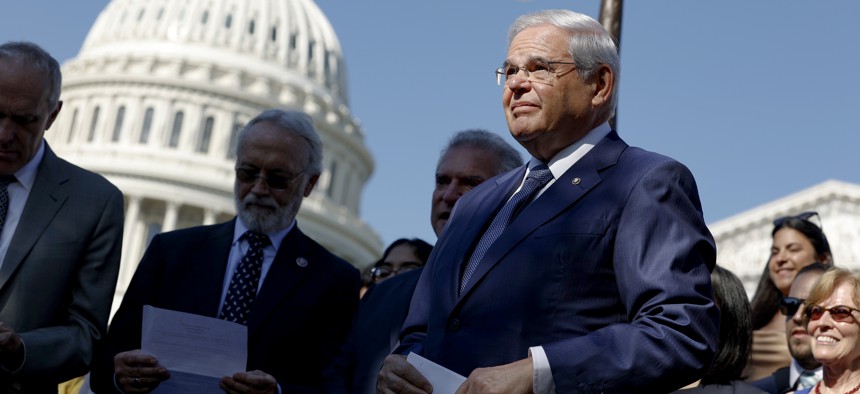Hopes Dim for Lifting SALT Cap in Senate Deal

Sen. Bob Menendez at a press conference in Washington, D.C. in June 2022. Anna Moneymaker via Getty Images
Sen. Bob Menendez, a key proponent of revamping a limit on the state and local tax deduction, is signaling he will support the measure even if it does not raise the $10,000 cap.
Those eager to see a cap lifted on a federal write-off for state and local taxes were dealt a blow Wednesday when U.S. Sen. Bob Menendez indicated that he plans to vote for a multi-billion dollar climate and health care package even if it does not expand the so-called SALT deduction.
The New Jersey Democrat has been among the lead advocates in Congress for lifting a $10,000 limit on the deduction, which Republicans imposed as part of their 2017 tax overhaul. The spending and tax package now pending in the Senate is likely one of the few opportunities to make that change. But Sen. Joe Manchin, of West Virginia, who brokered the proposal with Senate Majority Leader Charles Schumer, has indicated that he’s opposed to the move.
A Menendez spokesman said the lawmaker has been trying to get Senate leaders to address the issue in the package and will keep trying to increase the SALT deduction limit in other legislation.
“We're looking at the totality,” Menendez told Route Fifty, referring to the bill's potential benefits to his state, even if it does not raise the cap on the deduction.
Looking beyond SALT, Menendez told MSNBC that the massive bill “does a lot of good things.”
The proposal would spend $369 billion on climate and environment programs, $64 billion to allow millions to continue to afford health care coverage, and allow Medicare to negotiate down the prices of drugs with pharmaceutical companies.
“It ultimately will reduce for 1.6 million seniors in New Jersey and 60 to 65 million seniors across the country the cost of prescription drugs,” Menendez said. “And it will create a lot of great jobs.”
Still, he said, “this is not a perfect bill. I would have liked to have seen SALT in it to help middle class taxpayers get relief.
Menendez said during the interview with MSNBC on Wednesday that the legislation would lose his backing if Republicans are able to add anti-immigration amendments when the proposal goes to a vote on the Senate floor as early as later this week.
“I certainly cannot support it if extraneous provisions get adopted, particularly pejorative immigration provisions that have nothing to do with the health, welfare and security of the American people,” he said.
The lawmakers who have pushed to roll back the limit on the SALT deduction are generally Democrats from states with higher taxes, like New Jersey, New York and California. Democrats cannot lose any votes to get their climate and health care deal through the Senate, meaning the package could have been jeopardized if Menendez took a hardline stance on the SALT issue.
But the odds of including changes to the deduction in the bill looked slim from the outset with Manchin making his opposition clear.
“Our tax code should not favor red state or blue state elites with loopholes like SALT,” the West Virginia senator said in a statement last week announcing the deal with Schumer.
The National Association of Counties also expressed disappointment the issue was not addressed in the package. The group noted in a statement to Route Fifty that the House’s $1.75 trillion “Build Back Better” domestic spending bill from last year, which was slimmed down in Schumer and Manchin’s deal, would have raised the SALT cap to $80,000.
“NACo supports the full deductibility of all state and local taxes, particularly property taxes, in the federal tax code,” the group said.
But, similar to Menendez, NACo said there is a lot for counties to like in the bill. The group said several provisions “would deliver direct resources to counties, including investments in renewable energy infrastructure, the adoption of electric vehicles and the deployment of energy efficiency technologies in underserved communities.”
Kery Murakami is a senior reporter for Route Fifty.
NEXT STORY: State and Local Pensions Post Worst Losses Since Great Recession






